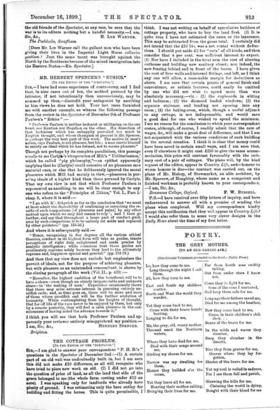MR. HERBERT SPENCER'S " ETHICS?'
[To THE EDITOR OF THE "SPECTATOR.") SIR,—I have had some experience of controversy, and I find that, in nine cases out of ten, the method pursued by the initiator, if not intentionally then unconsciously, may be summed up thus,—discredit your antagonist by ascribing to him views he does not hold. Your last issue furnished me with another example, as witness the following passage from the review in the Spectator of December 9th of Professor Paulsen's " Ethics " :— " Proreasor Paulsen is neither hedonist or utilitarian on the one nor Kantian nor Hegelian on the other. His dissection of that hedonism which has unhappily prevailed too much in English thought, and whose champion at present is Mr. Spencer, is ; erhaps the very best part of this work. The motive in men's action, Pays Paulsen, is not pleasure, but life ; a man exerts himself to satisfy an ideal which he has formed, not to secure pleasure."
Though not perhaps by its complete parallelism, this passage recalls to me Carlyiv's vituperation of Mill's "Utilitarianism,' which be called "pig philosophy,"—an epithet apparently implying that he (Carlyle). could conceive of no pleasures save
material ones, or else that he deliberately ignored the moral pleasures which Mill had mainly in view,—pleasures in pur-
se 1.1g ideals of a higher kind than those pursued by Carlyle. That my own view is not that which Professor Paulsen is represented ae ascribing. to me will be clear enough to any one who refers to the "Principles of Ethics," Vol. I., Part I: chap. 9, where it is said:— " I go with M. Siliwick as far as the conclusion that 'we must at least admit the desirability of confirming or correcting the re- sults of such comparisons [of pleasures and pains] by any other method upon which we may find reason to rely '; and I then go further, and say that throughout a large part of conduct gnid- a,nce by such comparisons is to be entirely set aside and replaced by other guidance." (pp. 155-56.)
And where it is subsequently said :—
"•Hence, recognising in due degrees all the various ethical theories, conduct in its highest form will take as guides, innate perceptions of right duly enlightened and made precise by analytic intelligence ; while conscious that these guides are proximately supreme solely because they lead to the ultimately supreme end, happiness special and general." (pp. 172-73.) And then that my view does not exclude but emphasises the pursuit of ideals, not for the purpose of achieving pleasure, but with pleasure as an unintended concomitant, is shown by the closing paragraph of the work (VOL II., p. 433) :— " Hereafter, the highest ambition of the beneficent will he to have a share —even though an utterly inappreciable and unknown share—in the making of man.' Experience occasionally shows that there may arise extreme interest in pursuing entirely un- selfish ends; and, as time goes on, there will be more and more of those whose unselfish end will be the further evolution of humanity. While contemplating from the heights of thought, that far-off life of the race never to be enjoyed by them, but only by a remote posterity, they will feel a calm pleasure in the con- sciousness of having aided the advance towards it."
I think. you will see that both Professor Paulsen and ap- parently your reviewer entirely misapprehend my position.—
Brighton.










































 Previous page
Previous page